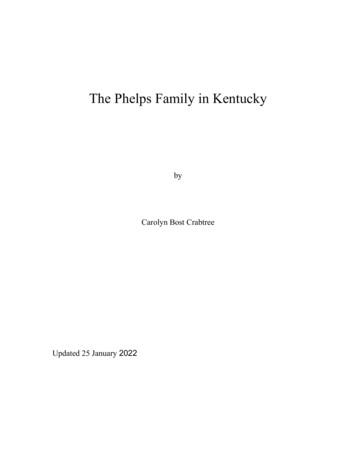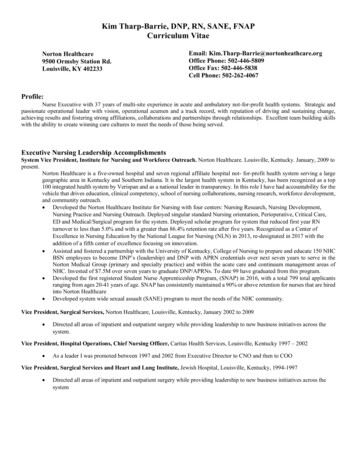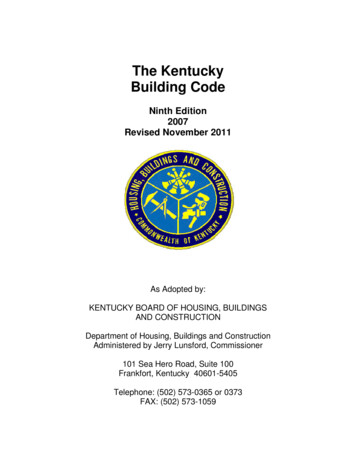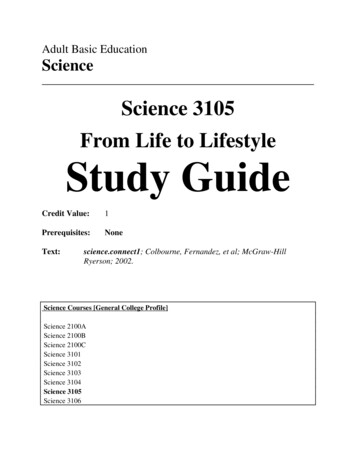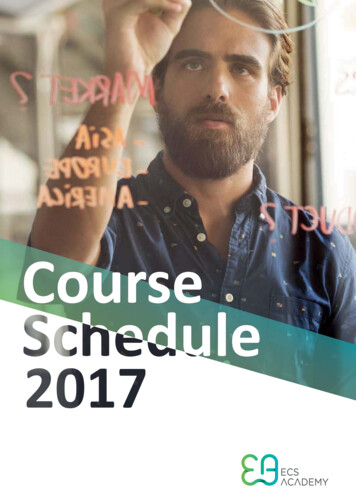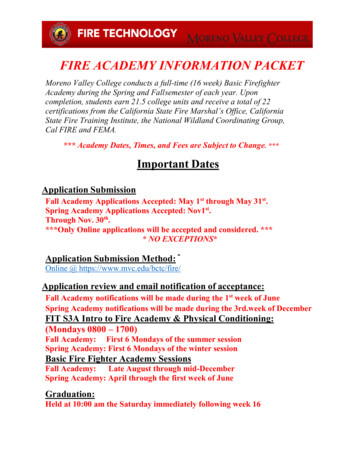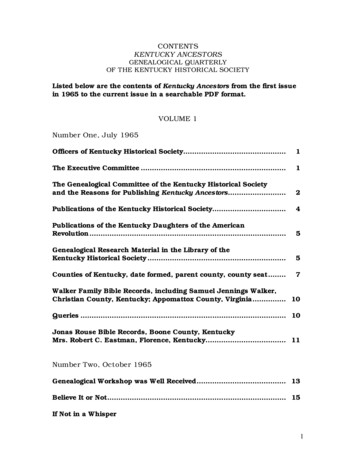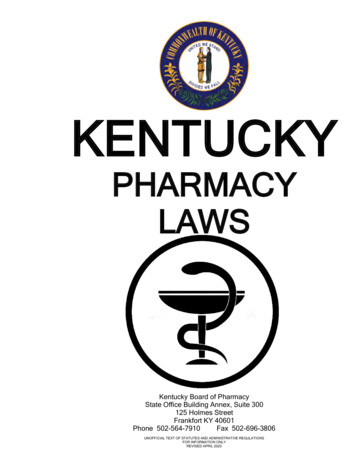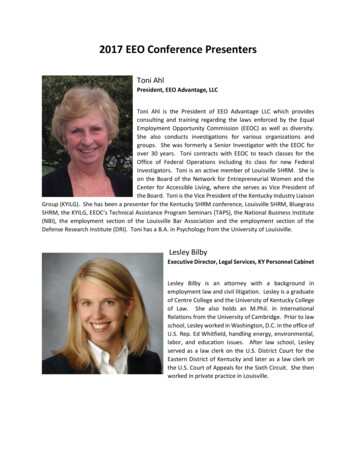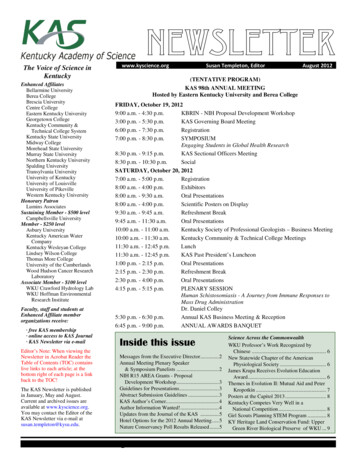
Transcription
NEWSLETTERThe Voice of Science inKentuckyEnhanced AffiliatesBellarmine UniversityBerea CollegeBrescia UniversityCentre CollegeEastern Kentucky UniversityGeorgetown CollegeKentucky Community &Technical College SystemKentucky State UniversityMidway CollegeMorehead State UniversityMurray State UniversityNorthern Kentucky UniversitySpalding UniversityTransylvania UniversityUniversity of KentuckyUniversity of LouisvilleUniversity of PikevilleWestern Kentucky UniversityHonorary PatronLumins AssociatesSustaining Member - 500 levelCampbellsville UniversityMember - 250 levelAsbury UniversityKentucky American WaterCompanyKentucky Wesleyan CollegeLindsey Wilson CollegeThomas More CollegeUniversity of the CumberlandsWood Hudson Cancer ResearchLaboratoryAssociate Member - 100 levelWKU Crawford Hydrology LabWKU Hoffman EnvironmentalResearch InstituteFaculty, staff and students atEnhanced Affiliate memberorganizations receive:· free KAS membership· online access to KAS Journal· KAS Newsletter via e-mailEditor’s Note: When viewing theNewsletter in Acrobat Reader theTable of Contents (TOC) containslive links to each article; at thebottom right of each page is a linkback to the TOC!The KAS Newsletter is publishedin January, May and August.Current and archived issues areavailable at www.kyscience.org.You may contact the Editor of theKAS Newsletter via e-mail atsusan.templeton@kysu.edu.www.kyscience.orgSusan Templeton, EditorAugust 2012(TENTATIVE PROGRAM)KAS 98th ANNUAL MEETINGHosted by Eastern Kentucky University and Berea CollegeFRIDAY, October 19, 20129:00 a.m. - 4:30 p.m.KBRIN - NIH Proposal Development Workshop3:00 p.m. - 5:30 p.m.KAS Governing Board Meeting6:00 p.m. - 7:30 p.m.Registration7:00 p.m. - 8:30 p.m.SYMPOSIUMEngaging Students in Global Health Research8:30 p.m. - 9:15 p.m.KAS Sectional Officers Meeting8:30 p.m. - 10:30 p.m.SocialSATURDAY, October 20, 20127:00 a.m. - 5:00 p.m.Registration8:00 a.m. - 4:00 p.m.Exhibitors8:00 a.m. - 9:30 a.m.Oral Presentations8:00 a.m. - 4:00 p.m.Scientific Posters on Display9:30 a.m. - 9:45 a.m.Refreshment Break9:45 a.m. - 11:30 a.m.Oral Presentations10:00 a.m. - 11:00 a.m.Kentucky Society of Professional Geologists – Business MeetingKentucky Community & Technical College Meetings10:00 a.m. - 11:30 a.m.11:30 a.m. - 12:45 p.m.Lunch11:30 a.m. - 12:45 p.m.KAS Past President’s Luncheon1:00 p.m. - 2:15 p.m.Oral Presentations2:15 p.m. - 2:30 p.m.Refreshment Break2:30 p.m. - 4:00 p.m.Oral Presentations4:15 p.m. - 5:15 p.m.PLENARY SESSIONHuman Schistosomiasis - A Journey from Immune Responses toMass Drug AdministrationDr. Daniel Colley5:30 p.m. - 6:30 p.m.Annual KAS Business Meeting & Reception6:45 p.m. - 9:00 p.m.ANNUAL AWARDS BANQUETInside this issueMessages from the Executive Director. 2Annual Meeting Plenary Speaker& Symposium Panelists . 2NIH R15 AREA Grants - ProposalDevelopment Workshop . 3Guidelines for Presentations. 3Abstract Submission Guidelines . 3KAS Author’s Corner. 4Author Information Wanted! . 4Updates from the Journal of the KAS . 5Hotel Options for the 2012 Annual Meeting . 5Nature Conservancy Poll Results Released . 58Science Across the CommonwealthWKU Professor’s Work Recognized byChinese . 6New Statewide Chapter of the AmericanPhysiological Society . 6James Krupa Receives Evolution EducationAward . 6Themes in Evolution II: Mutual Aid and PeterKropotkin . 7Posters at the Capitol 2013 . 8Kentucky Competes Very Well in aNational Competition . 8Girl Scouts Planning STEM Program . 8KY Heritage Land Conservation Fund: UpperGreen River Biological Preserve of WKU . 9
Messages from the ExecutiveDirectorAnnual Meeting Plenary Speaker& Symposium PanelistsI look forward to seeing everyone at the 2012 (98th) KASAnnual Meeting on the campus of Eastern KentuckyUniversity. Online pre-registration is now available. Toreceive a discounted rate, please pre-register for the meeting atwww.kyscience.org by Friday, September 21, 2012. After thisdate all registrations must be completed on-site.Meeting pre registrations rates are 10 for all students, 35 forregular KAS members and 60 for non KAS members. Therewill be no refunds after September 21. Onsite registration feeswill be 15 for students, 50 for regular KAS members and 70 for non KAS members.Dan Colley is a University of GeorgiaDistinguished Research Professor ofMicrobiology and Director of the UGACenter for Tropical and Emerging GlobalDiseases, and a past Director of theParasitic Diseases Branch of the USCenters for Disease Control andPrevention. Dr. Colley has workedextensively on the immunology of humanparasitic infections in Brazil, the West Indies, Egypt, andKenya. In 2008, he received a 19-million award from the Bill& Melinda Gates Foundation to find ways to identify, controland eliminate schistosomiasis. Dr. Colley’s Plenary topic willbe Human Schistosomiasis - A Journey from ImmuneResponses to Mass Drug Administration; his symposium paneltopic is Lessons Learned through Global Health Research inSt. Lucia, Brazil, Egypt, Kenya and CTEGD.If you are not a KAS member and plan on joining KAS, pleasejoin and activate your membership prior to registering for themeeting to receive the member discount. If you have forgottenyour KAS membership password you can retrieve theinformation as well as membership activation codes via thelog in section on the KAS homepage.KAS Annual Awards Banquet tickets remain 25/each exceptfor students participating in the Undergraduate Graduate(URC) or Graduate Research Competitions (GRC). Banquettickets for URC and GRC participants are 5/each. Please notewe have a limited space for the banquet this year. Banquettickets are first come first serve and tickets wi11 be taken atthe door.Nancy Rice is an Associate Professor ofBiology at Western Kentucky University,where she developed the Partners inCaring: Medicine in Kenya (PiC:MiK)program, now in its fifth year. Theprogram’s aim is to stimulate globalhealth awareness in pre-medicalundergraduate students through hands-oninternational medical service-learning and researchexperiences. Currently, Dr. Rice and her students areexamining the molecular mechanisms that lead to the highprevalence of essential hypertension (EH) in rural Kenya in aproject funded through a KBRIN-AREA award. Her paneltopic will be Integrating Undergraduates in SubstantiveGlobal Health Research Projects: Lessons from Kenya.For your convenience, universities may pay for multiplemeeting attendees at one time utilizing the Payment Only linkfound on the KAS website/annual meeting page. Paymentshould be made prior to attending the meeting to avoid a longwait when you arrive at the meeting. If you have questionsplease contact me at 859-227-2837.Many of the 2012 KAS Annual Meeting functions will be heldin the EKU New Science Building (below). Tours of this stateof the art facility will be given during the upcoming meeting.Carol Etherington is an AssociateProfessor of Nursing at VanderbiltUniversity and Associate Director ofCommunity Health Initiatives forVanderbilt’s Institute for GlobalHealth. She has worked withtraumatized populations around theglobe. She established one of the firstpolice based counseling programswithin the Nashville Metropolitan Police Department and hasworked throughout the U.S. during times of natural and manmade disasters including earthquakes, hurricanes, schoolshootings and New York City post 9/11. She served on aninternational emergency medical team in the aftermath of thePol Pot genocide. In the early 90s, she completed fourmissions in war-torn Bosnia, and since 1996, has worked withMédecins Sans Frontières (Doctors Without Borders) inBosnia, Poland, Honduras, Tajikistan, Kosovo, Sierra Leone,Angola and in the Darfur refugee camps of Eastern Chad. Herpanel presentation is Perspectives on the Evolving Roles andResponsibilities of Academic Institutions in Global Health.See you in October!Jeanne Harris, KAS Executive DirectorSubmitted by KAS President-Elect Cheryl D. Davis2TOC
NIH R15 AREA Grants Proposal DevelopmentWorkshopGuidelines for PresentationsOral: All presentations should be compatible with PowerPoint version 2007 for Windows and brought on a USB driveas the computers will not have a CD drive. You must be inyour assigned room 15 minutes before your session isscheduled to start in order to load your presentation.Friday, October 19th, EKU, Location: To be announcedThe Kentucky Biomedical Research Infrastructure Network(KBRIN) will again offer an intensive workshop on thedevelopment of National Institutes of Health (NIH) R15Academic Research Enhancement Award (AREA) proposals.AREA grants are specifically designed to support smallresearch projects in the biomedical and behavioral sciencesconducted by faculty and students in colleges/universities andhealth professional schools that have not received more than 6 million in NIH research grants in four of the last sevenfiscal years. Thus, faculty at all colleges/universities inKentucky, except U of L and UK, are eligible.Poster: Each presenter will be provided with an easel and a4x4 ft. poster board identified with a number that matches thepresenter’s number in the program booklet. All posters will belocated in the New Science Building. This year the posterpresentations will be divided into a morning (AM) session andan afternoon (PM) session. The week prior to the meeting theprogram will be listed on the KAS website and will show theAM and PM sections.Set upJudgingRemovalThe three main goals of the AREA program are: (1) to supportmeritorious research; (2) to strengthen the researchenvironment of the institution; and (3) to expose students toresearch.Morning Session7:30 - 8:00 a.m.9:00 a.m. until done11:30 a.m. - NoonAfternoon Session12:00 - 1:00 p.m.2:00 p.m. until done4:00 p.m.If you have any questions, please contact Dr. Robert Creek,Program Coordinator, at robertcreek@bellsouth.net.The workshop will be led by faculty at KBRIN institutionsthat have been successful in competing for AREA grants. Themorning session is designed for faculty with little of no NIHgrant writing experience, whereas the afternoon session isdesigned to enhance the competitiveness of more experiencedfaculty. Depending upon level of experience with the NIH,registrations will be accepted for the either the full dayworkshop or the afternoon workshop only.Abstract Submission GuidelinesThe DEADLINE for submitting an abstract for presentation isSEPTEMBER 21, 2012. Forms will not be available after thisdate. There are a limited number of positions available forOral presentations so submit as soon as possible. If a positionis not available upon receiving your abstract you will benotified and given the opportunity to present a poster.The morning workshop will begin at 9:00 am EST and theafternoon session will begin at 1:00 pm EST. Lunch will beprovided at noon.To submit an abstract for presentation, either Oral or Poster,go to the KAS website at http://www.kyscience.org. On theleft side of the page click on ANNUAL MEETING and thenselect SUBMIT AN ABSTRACT. This page will allow you tolog on as a member or non-member and then go to the formfor Submitting an Abstract. YOU MUST BE PREREGISTERED in order to submit an abstract. If you have notthere will be a link to the pre-registration page that will allowyou to do so after which you will return to the AbstractSubmission Form to submit your abstract. It is recommendedthat you go to the GUIDELINES FOR PREPARATION OFABSTRACTS to make sure your abstract is in the properformat. Your abstract needs to be submitted in one of thefollowing: Word 2007 (.doc), Rich Text Format (.rtf) orAcrobat PDF (.pdf). You will receive a notice via e-mail thatyour abstract has been received. The program, uponcompletion, will be placed on the website at which time youwill be able to determine the time and location of yourpresentation. All presentations will be on Saturday, October20. If you have any questions, please contact Dr. RobertCreek, Program Coordinator, at robertcreek@bellsouth.net.The workshop is free and open to interested faculty at allKentucky public and private institutions. As space is limited,please register by Friday, October 5th, by contactingMs. Whitney Rogers, KBRIN UBM atwhitney.rogers@louisville.edu or 502-852-3045.For additional workshop information, contactDr. Nigel Cooper, KBRIN PI (nigel.cooper@louisville.edu)or Dr. Bruce Mattingly, KBRIN program coordinator(b.mattingly@moreheadstate.edu).This workshop is sponsored by the Kentucky BiomedicalResearch Infrastructure Network (KBRIN), which is supportedby grants from the National Center for Research Resources(5P20RR016481-12) and the National Institute of GeneralMedical Sciences (8 P20 GM103436-12) from the NationalInstitutes of Health.Submitted by Bruce A. Mattingly,Program Coordinator, Kentucky Biomedical ResearchInfrastructure Network (KBRIN)Submitted by Robert Creek, Program Coordinator3TOC
KAS Author’s CornerLoganathan, B.G. and Lam,P.K.S. (Editors). 2012. GlobalContamination Trends ofPersistent Organic Chemicals.CRC Press. Boca Raton, FL.638pp . ISBN: 978-1-43983830-3.Wilson J. González-Espada,Daniel A. Colón Ramos, andMónica I. Feliú Mójer(Editors). 2011. ¡CienciaBoricua! CAPRIIC. ISBN13: 978-1881748830.Language: Spanish.Bommanna G. Loganathan,Ph.D., is a professor ofenvironmental/analyticalchemistry at the Murray StateUniversity (MSU), Kentucky,USA. His current researchinvolves investigations on the distribution, environmentaltransformation, and fate of persistent organic/organometallicpollutants in the environment and their effects on wildlife andhuman health. A major focus of his research is to evaluatestatus and trends of classical as well as emerging pollutants inman-made freshwater lakes such as Kentucky Lake incomparison with natural lakes and marine ecosystems, and toassess the effects of these compounds on human natural killercells’ ability to kill cancer cells using in vitro assays. PaulK.S. Lam is Chair Professor of biology at the City Universityof Hong Kong with extensive research experience in marineenvironmental research. He is particularly interested in theresponses of organisms to toxic chemicals and algal toxins, aswell as the risk assessment of these compounds.Morehead State University’sDr. Wilson González-Espada,associate professor of physicsand science education, alongwith Dr. Daniel ColónRamos, assistant professor of cell biology at Yale School ofMedicine, and Mónica Feliú-Mójer, a Ph.D. candidate inneuroscience, Department of Neurobiology, Harvard MedicalSchool, were editors of the book ¡Ciencia Boricua! Ensayos yAnécdotas del Científico Puertorro (Boricua Science! Essaysand Anecdotes by Puerto Rican Scientists).According to Dr. González-Espada, the book “is culturallyrelevant, family-oriented, and accessible for the generalpublic. We are convinced students will enjoy reading itbecause they will read about familiar places, neighboringcommunities and local contexts. Ciencia Puerto Rico alsodecided to publish the book because we noticed that mostpeople were not aware of the high quality science that goes onin the Island.”Environmental pollution by man-made persistent organicchemicals (POCs) has been a serious global issue for over halfa century. Exposure to certain POCs may result inenvironmental and health effects including birth defects,diminished intelligence and certain types of cancers.Therefore, POCs have been the subject of an intensiveregional, national and international effort to limit theirproduction, use, and disposal of these chemicals. Since POCsare prevalent in air, water, soil, tissues of organisms (includingwildlife and humans) throughout the world and cause longterm effect in organisms, trend monitoring studies are essentialto make clear the behavior and fate of these compounds and toprotect our environment and living resources. GlobalContamination Trends of Persistent Organic Chemicalsprovides comprehensive coverage of spatial and temporaltrends of “classical” as well as emerging contaminants inaquatic, terrestrial and marine ecosystems, including theArctic and Antarctic ecosystems. Compiled by an internationalgroup of experts, this volume covers the history, presentstatus, and projected future trends of environmentalcontamination by certain highly toxic synthetic chemicals.Relevant to professionals and students alike, this bookfacilitates the understanding environmental and biologicalbehavior of these chemicals and development ofstrategies/practices for protecting the global environment forfuture generations.The 235-page book aims to foster an interest in science amongPuerto Ricans and Hispanics. Twenty-three Puerto Ricanscientists from the Island and abroad collaborated in thiseffort, writing 61 short essays on diverse topics such asastronomy, biomedical sciences, geology, chemistry, andscientific research. ¡Ciencia Boricua! was published byEdiciones Callejón and is available at Amazon.com. Proceedsfrom the sale of the book will help fund several of CienciaPuerto Rico’s educational projects.Information is available from Dr. González-Espada at 7832927; you can contact Ciencia Puerto Rico directly atcontact@cienciapr.org for additional details.Author Information Wanted!If you are a KAS member and have recently published ascience focused book please forward this information to theKAS newsletter editor (susan.templeton@kysu.edu) so thatyour accomplishment can be shared with other scientists inKentucky. Please include the title of the book, yourname/other authors and affiliation, and a brief synopsisregarding the subject matter of the book. KAS promotes thedissemination of the scientific interests of the Commonwealthof Kentucky. We look forward to hearing from you!4TOC
Updates from the KAS JournalThe next issue of the Journal of the Kentucky Academy ofScience (Volume 72, Issue2) will be available shortly. JournalEditor Marty Matisoff has been working diligently to get theJKAS back on schedule.We would like to acknowledge the following authors andthank them for their contributions to this issue: Tyler Morgan and Charles L. Elliott: “Comparison ofCamera vs. Howling Surveys for Estimating Coyote(Canis latrans Say) Abundance in Central Kentucky.” Jessica C. Lair and Jerry D. Cook: “A Study of aCommon Misconception in Appalachian KentuckySeventh and Eighth Grade Science Students: Free Falland Inertia.” Valerie Pence, David Taylor, Bernadette Plair, SusanCharls, and John Clark: “Micropropagation,Cryopreservation, and Outplanting of Minuartiacumberlandensis, the Cumberland Sandwort.” Jaffer Mohammed, Moses Henderson, RebeccaWilliams, Rukhsana Sultana, Joshua Owen, and TaneaReed: “Quantitative proteomic analysis of differentiallyexpressed proteins in Aβ(17-42) treatedsynaptosomes.” Marco Ciocca and Jing Wang: “Watching andListening to the Coefficient of Restitution.”Nature Conservancy PollResults ReleasedThe Nature Conservancy recently completed a bi-partisannational survey of voter attitudes about conservation withfascinating results—one of which is that four out of five votersthink conserving America’s lands and waters is patriotic.Results include:We would also like thank those individuals who gave up theirtime to review the manuscripts. MANY THANKS. If youwould like to become a peer reviewer, please contact ourJournal Editor, Martin Matisoff, at martin.matisoff@kysu.edu.Your help is needed and greatly appreciated!Submitted by Martin Matisoff, Journal Editorand Jeanne Harris, Executive Director Three-quarters of the electorate believes that publiclands are one of the things government “does best.” In fact, public lands such as some of the iconic nationalparks, are far preferred in Americans’ summer vacationplans. Three-quarters say that even with federal budgetproblems, funding for conservation should not be cut. Voters are willing to put their money where theirmouth is. Fully 83 percent are willing to pay additionaltaxes to protect American land, water and wildlife. Underlying some of this support and willingness to paymay be a sense that there are economic benefits toconservation. Voters are twice as likely to say thatprotections for land, air, water and wildlife have apositive impact on jobs (41 percent), than a negativeimpact (17 percent), or little impact one way or theother (33 percent). Underlying some of this support andwillingness to pay may be a sense that there areeconomic benefits to conservation. The overwhelming majority of American voters rejectsthe notion that protecting our environment is at odds.Hotel Options for the 2012KAS Annual MeetingSeveral Richmond hotels have room blocks that will be held atspecial Kentucky Academy of Science rates. The KAS .php) has a listingwith location maps, rates, and cut-off dates for the followinghotels: For more information about how this poll was conducted, visitthe Nature Conservancy Newsroom. You can visit our websiteat http://nature.org/kentucky to sign up for our Great Placese-newsletter to get free monthly updates about conservation inKentucky and around the world.Best Western Holiday PlazaDays InnHampton InnJameson InnHoliday Inn ExpressLaQuinta, andRed Roof Inn.Submitted by Terry Cook, State Director,The Nature Conservancy of Kentucky5TOC
Science Across the CommonwealthWKU Professor’s WorkRecognized by ChineseJames Krupa ReceivesEvolution Education AwardDr. Chris Groves (left) has beennamed a finalist for the 2012People’s Republic of ChinaFriendship Award, the country’shighest honor for foreign expertswho work in China. About 50winners are given the award eachyear and will be honored Oct. 1,during the celebration of NationalDay, which marks the founding ofthe People’s Republic of China.University of Kentucky Biology professor James Kruparecently received the 2012 Evolution Education Award fromthe National Association of Biology Teachers (NABT). Thisaward recognizes innovative classroom teaching andcommunity education efforts to promote the accurateunderstanding of biological evolution. Sponsored by theBiological Sciences Curriculum Study (BSCS) and NationalEvolutionary Synthesis Center (NESCent), the honor will beofficially presented to Krupa at the NABT annual ProfessionalDevelopment Conference in Dallas, Texas. Krupa, who beganteaching biology at UK in 1995, also received the NABTUniversity Teaching Award last year.Groves, a professor of geography and geology at WesternKentucky University, has been interested in caves sincechildhood, a passion that has taken him to study caves inChina. He made his first trip to China in 1995 and has beenback 25 more times since then. He’ll embark on his 27th triplater this year.In an interview with UK Information Specialist Sarah Geegan,Krupa noted “From a historical perspective, it is also amazingthat I ended up here because the first (unsuccessful) effort topass anti-evolution laws, led by William Jennings Bryan, wasin Kentucky in 1921 At the time, John Thomas Scopes was astudent at UK watching the efforts of his three favoriteteachers: Funkhouser, Miller, and Terrell. The reason theScopes Trial occurred is in part due to inspiration by thesegreat teachers."The nomination recognizes Groves’ work in China’s karstlandscape, which is an area with many caves. His main projectin China deals with the water resources of the country’s karstareas, working to help Chinese find and map where sources ofwater are in caves so they can drill wells there and collect thewater. He’s also part of a research team in China trying tounderstand how cave formation is affecting carbon dioxidelevels and climate change.Scopes' trial, the landmark court case in Dayton, Tennessee,was the first effort to overthrow a state’s anti-evolution law in1925. Scopes was found guilty of teaching evolution, and thisdecision was later thrown out on a technicality. Krupa saidthat he considers the nearly century-old case as motivation toprovide exemplary teaching.New Statewide Chapter of theAmerican Physiological Society"I think it is great that the NABT has an award for teachingevolution," Krupa said. "It is such an important subject ofbiology that we must be encouraged to teach it as well aspossible in every high school and college biology class."Drs. Robin Cooper (UK Biology), Michael Reid (UKPhysiology), and Francisco H. Andrade (UK Physiology)have brought together physiologists from across theCommonwealth to form the Kentucky Chapter of theAmerican Physiological Society (APS). The APS is aninternational organization with over 10,000 members thatfosters education and research in the physiological sciences.The goal of the new Kentucky chapter is to bridge institutionsand bring together researchers, educators and studentsinterested in physiology. Later this year, this brand new APSchapter (which will be referred to as KYPhys) will hold itsinaugural meeting at The University of Kentucky. Dr. Cooperannounced “We encourage a state wide participation in theexecutive committee and the chapter that reflects the statewide membership. Please think about running for an office.”The complete article with Krupa’s interview is availableonline at http://bio.as.uky.edu/teaching-evolution.Founding officers are: President Dr. Robin L. Cooper,President Elect Dr. Michael B. Reid, and Secretary/TreasurerDr. Francisco H. Andrade. You may contact Dr. Robin Cooperfor further details at RLCOOP1@email.uky.edu.UK Biology professor James Krupa6TOC
Themes in Evolution II: Mutual Aid and Peter Kropotkinindividuals who aid them. In primate societies, for example, kinrecognition and friend-enemy discriminations may have spreadthroughout a population in part by the evolution of females’protective behaviors of their offspring.Not all of the forces driving evolution are competition for limitedresources or striving to live at the expense of others. Mutual aidand cooperation were observed by the Russian prince PeterKropotkin (1842-1921) who tried to explain them. Lee AlanDugatkin, Professor and Distinguished University Scholar in theDepartment of Biology at the University of Louisville, is anauthority on the “Prince of Evolution,” who recognized theimportance of Darwinian evolution in his time and sought to alignit with his observations of communities of animals, includinghumans, in harsh Siberian environments. There, Kropotkin saw“the overwhelming importance which sociable habits play inNature and in the.evolution of animal species and humanbeings.” Kropotkin disagreed with “the followers ofDarwin.[who] reduced the notion of struggle for existence to itsnarrowest limits and.[viewed] the animal world as a world ofperpetual struggle among half-starved individuals.” Kropotkinsaw that evolution had resulted not in “that bitter struggle for themeans of existence, among animals belonging to the samespecies,” but the struggle of animals together “against aninclement Nature.” Mutual aid was a fact of evolutionary history,“necessary for the preservation [and] welfare,.of every species.”Hundreds of members of species of birds, rodents, and deer actedtogether in mutual aid and support to accomplish mutual survival.Mutual aid, was “.met with even amidst the lowest animals.” Ina statement reflecting his intuition that paramecia and algae maybehave in cooperative ways, Kropotkin wrote “. we must beprepared to learn some day, from the students of microscopicalpond-life, facts of unconscious mutual support, even from the lifeof microorganisms.”However, in a population in which altruist-recognition genes are amajority, it may happen that an individual recognizes the altruistand takes advantage of the altruist by gaining favors from himwithout repaying the behavior. Kropotkin saw the human societyof instinctive mutual aid threatened by what he called “parasites”in the form of individuals who tried to coopt all resources forthemselves, without returning anything to others. For Kropotkin,parasites could be eliminated, along with the environment inwhich they thrived.Another solution to the problem of “parasites,” a genetic solution,has been proposed, suggested by game theory. In a population ofindividuals, some of which do altruistic behaviors, and somewhich accept, but do not repay, the “parasites” gain an advantageif benefits are higher than the cost of doing the behavior.However, if enough individuals remember incidents of servingand not being served in return, an evolutionary stable strategy canexist in a population. The exploiters will always be favored in thepay off, and individuals who always emit favors will be exploited,but individuals who “keep score” and do not give favors to thosewho do not repay them will strike a balance with the exploiters.Even inner, unseen states, the same as those underlying classicaldrive-reduction theories of motivation, were proposed byKropotkin as the origin of altruistic behavior. Since animals act torepeat behaviors that are followed by satisfying outcomes, as E.L.Thorndike proposed in his law of effect, Kropotkin sawevolutionary benefit for animals that associated ethical acts withpleasurable outcomes: “When monkeys [have] seen one of theirmembers fall [from] a hunter’s shot, these monkeys obey afeeling of compassion stronger than personal security. The feelingbecomes so oppressive that [they] do everything to get rid of it.”Kroptkin identified his “mutual-aid instinct” with what Darwincalled a “permanent instinct,” always at work in all socialanimals. Far from it being a moral imperative, he argued that“s
Bellarmine University . Berea College . Brescia University . Centre College . Eastern Kentucky University . . (TENTATIVE PROGRAM) KAS 98th ANNUAL MEETING . Hosted by Eastern Kentucky University and Berea College . FRIDAY, October 19, 2012 . 9:00 a.m. - 4:30 p.m. KBRIN - NIH Proposal Development Workshop .

